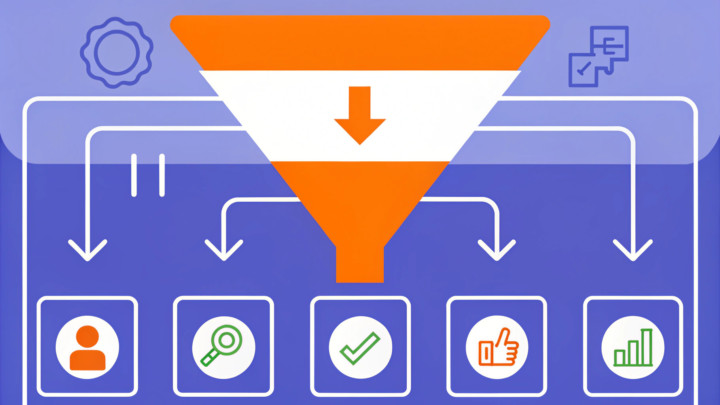Discover the top 15 AI sales agent tools revitalizing the sales process
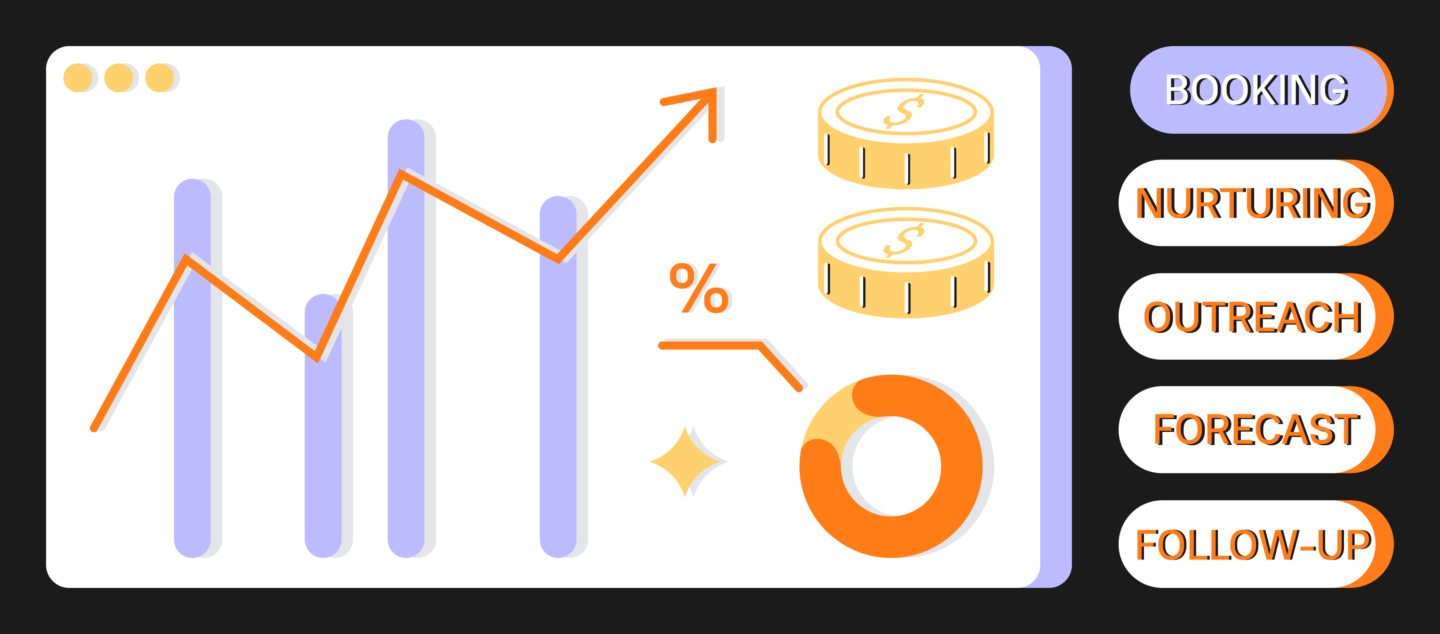
Struggling to maintain momentum in a demanding sales landscape? This roundup of the top 15 AI sales agent tools will guide you through the gamut of AI-driven solutions — from prospecting and outreach to accurate forecasting — streamlining your sales efforts for unparalleled efficiency and effectiveness.
What is an AI sales agent?
An AI sales agent is a sophisticated software application that uses artificial intelligence to automate and enhance various tasks within the sales process. By analyzing data and learning from interactions, these agents can perform a myriad of functions to augment the efficiency of sales teams.
Tasks an AI sales agent can assist with:
- Lead identification and qualification
- Personalized customer outreach and engagement
- Sales call scheduling and follow-up automation
- Real-time insights and recommendations based on data analytics
- Email drafting and response management
- Pipeline management and forecasting
- Enhancing customer relationship management (CRM) data entry and accuracy
- Chatbot conversations for initial customer inquiries
Dashly
Best for: Conversion of inbound leads
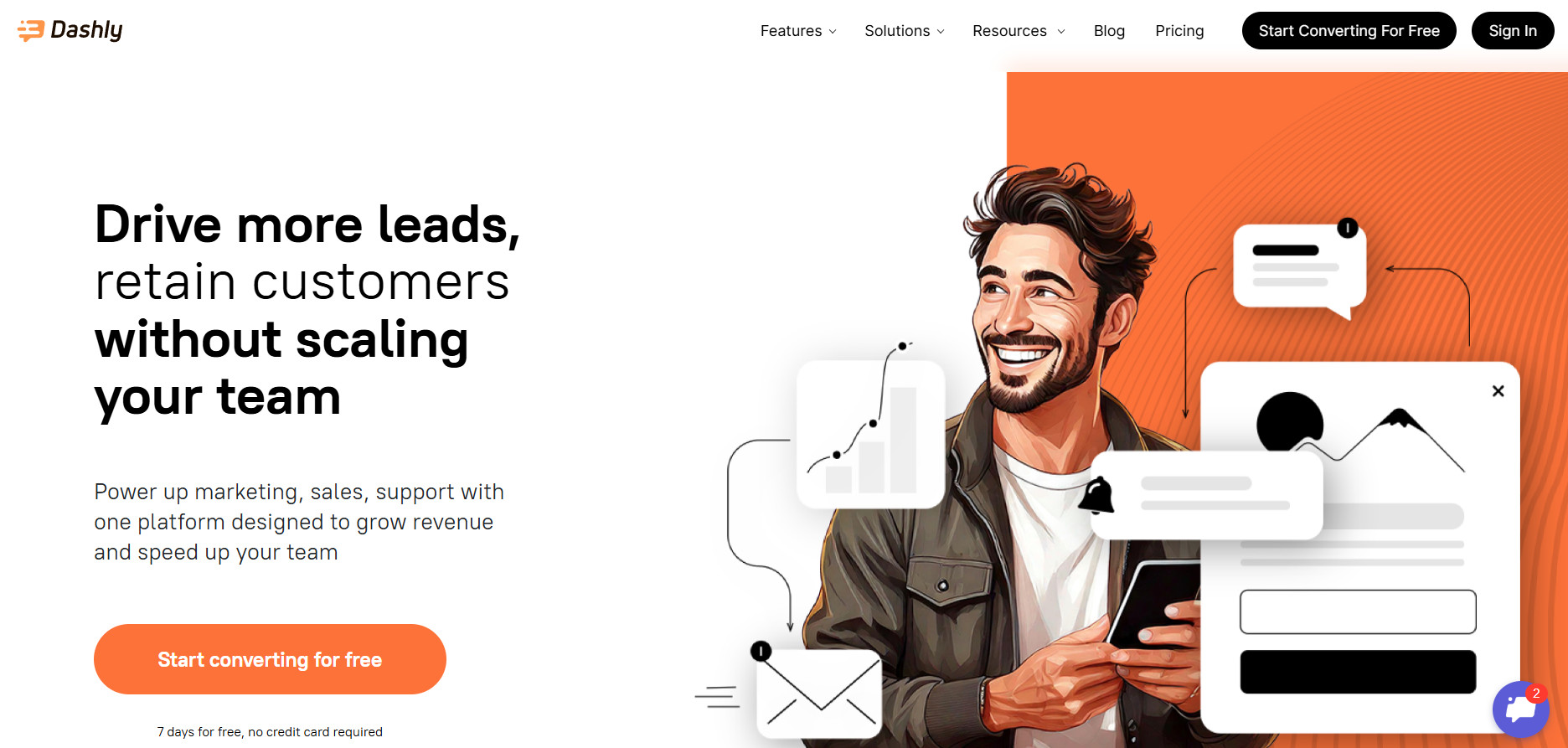
Dashly emerges as a crucial conversational AI sales agent for SaaS businesses that face a deluge of inbound leads but want to refrain from a proportional increase in sales team size. It specializes in optimizing lead interaction without overextending resources, making it a perfect match for companies aiming to scale their engagement strategies smartly.
Features for sales
- Lead qualification through multiple channels, including website chat, email, and messaging apps.
- Identification and nurturing Marketing Qualified Leads (MQLs) to schedule meetings with appropriate team members.
- Consistent lead nurturing across all available channels to encourage them to attend the meeting.
- Guiding non-MQL users towards a self-service funnel, promoting user independence and easing the sales team’s workload.
Dashly’s platform is designed for effortless integration into your existing sales processes, helping you to manage and convert leads more effectively by leveraging AI efficiency, ensuring your sales team can focus on high-value tasks and conversations.
Here’s how Dashly’s AI sales agents qualifies leads and guides MQLs and non-MQLs down different funnels 👇

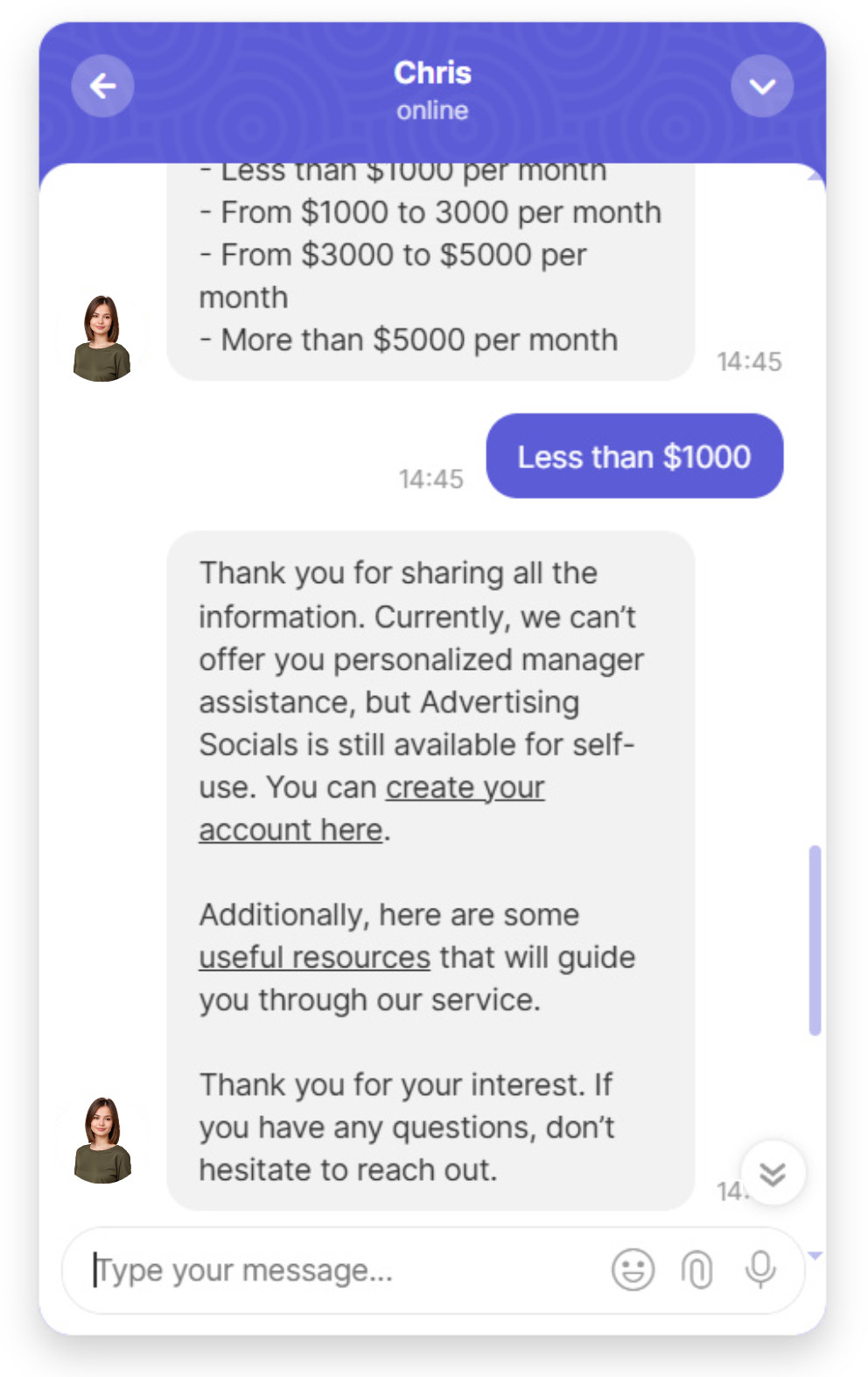
Pricing
Pricing for Dashly is tailored to accommodate your website’s specific traffic needs and is available upon request.
To discover if Dashly is the right fit for your company and receive a personalized quote, schedule a meeting with a Dashly representative who can provide detailed information based on your team’s needs 👇
Clay
Best for: Data enrichment for more effective prospecting

Clay positions itself as a highly intuitive AI sales agent platform, perfect for businesses and sales reps needing advanced data enrichment to supercharge their prospecting endeavors. The tool excels in the startup and tech sectors, as well as among small to midsized companies eager to leverage robust data to pinpoint key prospects.
Features for sales
- Automatic gathering and organizing of contact information for leads.
- Synthesizing data across various sources to create comprehensive prospect profiles.
- Enabling personalized sales outreach through enriched contact details.
- Providing detailed lead scoring to prioritize efforts on warm leads.
Pricing

Clay offers flexible pricing plans to cater to different sales needs and team sizes. Ranging from a Starter plan for individuals and small teams, to a Business plan ideal for growing businesses, and a Custom plan that is built to match the breadth and depth of larger enterprise needs. Their features scale with the complexity of the organization, ensuring that your investment aligns with the value received.
Artisan
Best for: Automating outbound sales with an AI SDR
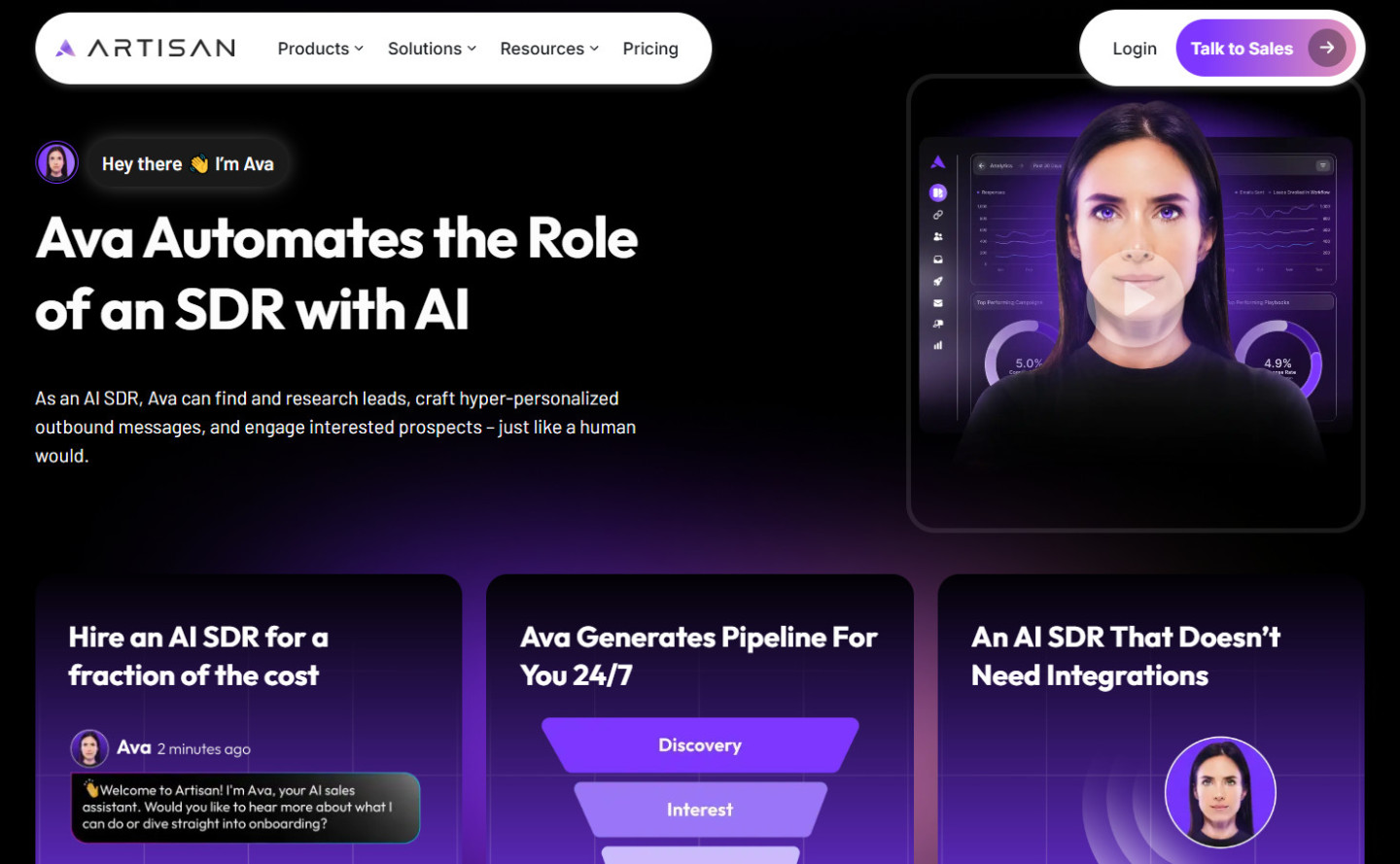
Artisan is built to streamline outbound prospecting through its autonomous AI sales agent, Ava. Designed to replace manual SDR work, Ava identifies leads, crafts personalized messages, and follows up — all without human oversight. This allows Sales teams to focus more on closing and less on cold outreach.
Artisan suits mid-sized to enterprise B2B companies with established pipelines and ambitious growth goals. It’s especially useful for industries with long sales cycles and high-touch lead nurturing, such as SaaS, tech, and professional services. By offloading repetitive tasks to AI, agents can work faster and more efficiently.
Features for sales
- Discovering new leads across a 300M+ contact database
- Enriching lead data with job titles, industries, and tech stack
- Sending personalized outreach via email and LinkedIn
- Optimizing inbox placement and warming up domains
- Notifying sales reps about active, engaged leads
Pricing
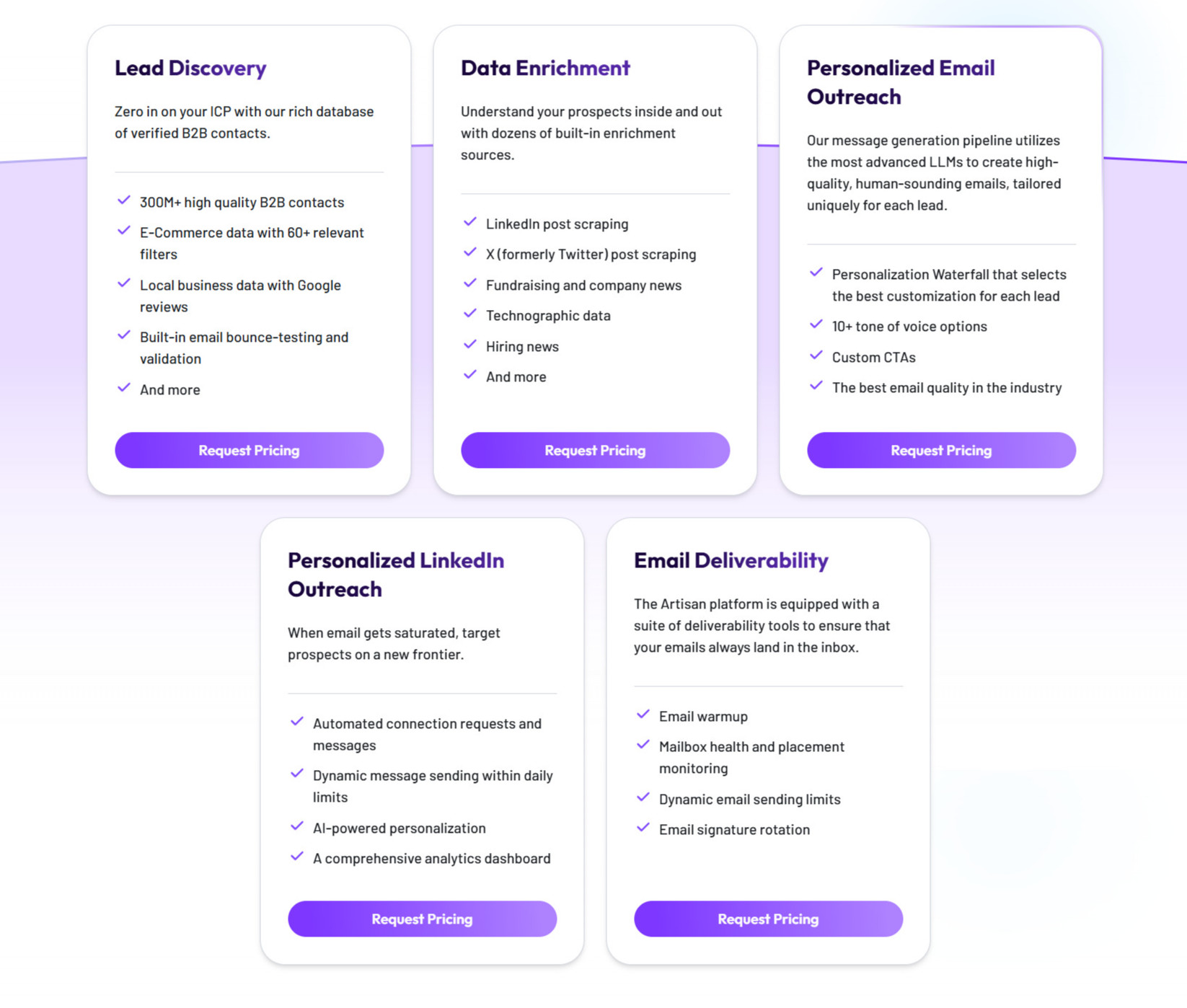
Artisan’s pricing is based on the volume of leads contacted annually. Plans include:
- Lead Discovery for targeting ICP
- Data Enrichment for understanding your prospects
- Personalized Email Outreach for automated email communications
- Personalized LinkedIn Outreach for automated email communications
- Email Deliverability to make sure your emails reach your prospects
Pricing details are customized; interested customers should contact Artisan’s sales team for a quote.
Botsonic
Best for: automating customer support and lead engagement with AI chatbots
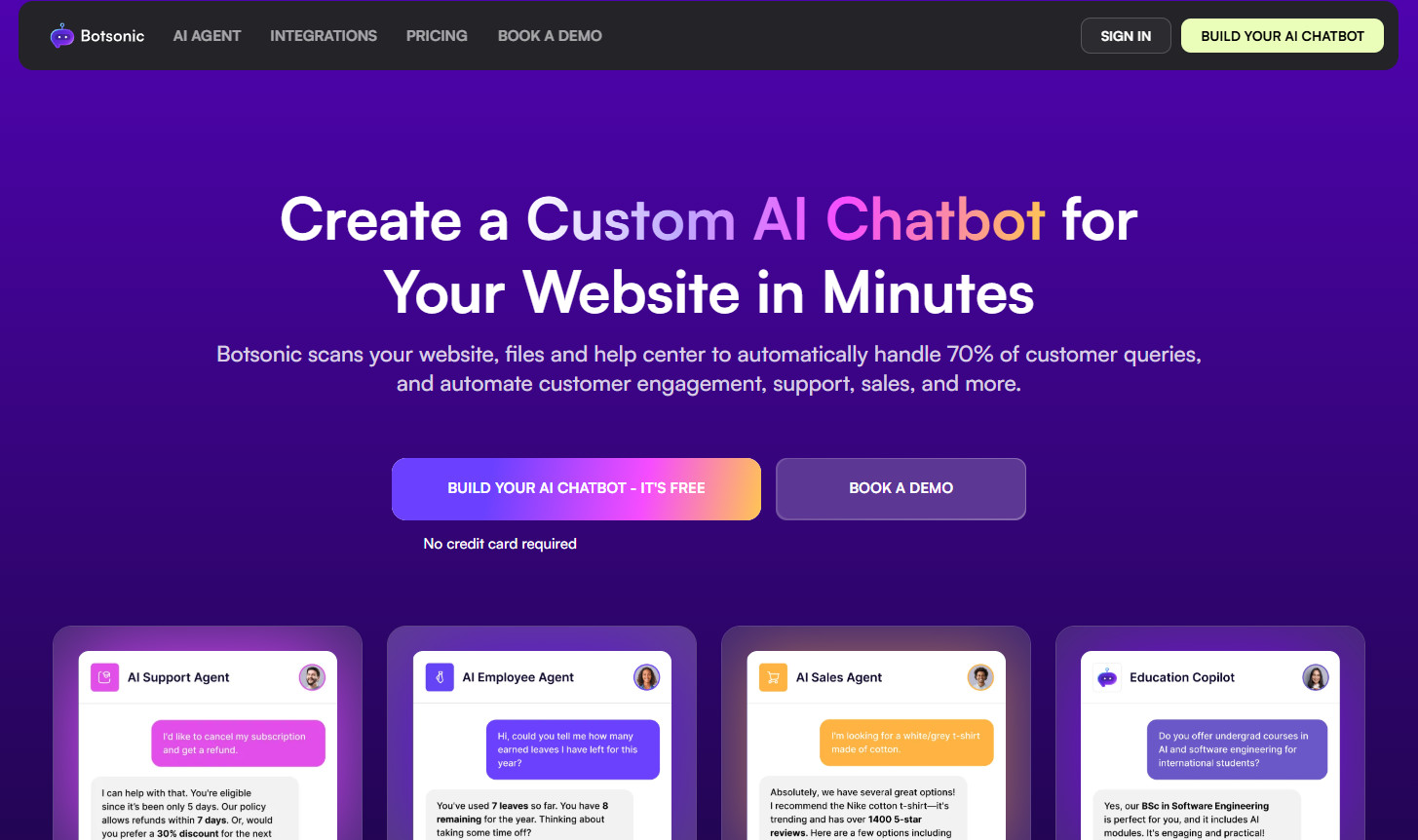
Botsonic is a no-code platform designed to help businesses deploy intelligent AI sales agents that automate customer support, lead capture, and conversational commerce. By scanning your website, documents, and help center, Botsonic can resolve up to 70% of customer queries instantly, freeing up human agents to focus on more complex tasks.
Botsonic is ideal for small to mid-sized businesses across industries like e-commerce, SaaS, healthcare, and education. Its intuitive interface and robust integrations make it accessible for teams without technical expertise, allowing them to enhance sales and support operations efficiently.
Features for sales
- Automating customer support across multiple channels
- Capturing and qualifying leads through interactive forms
- Providing personalized product recommendations
- Scheduling appointments and handling bookings
- Seamlessly handing off to human agents when needed
Pricing
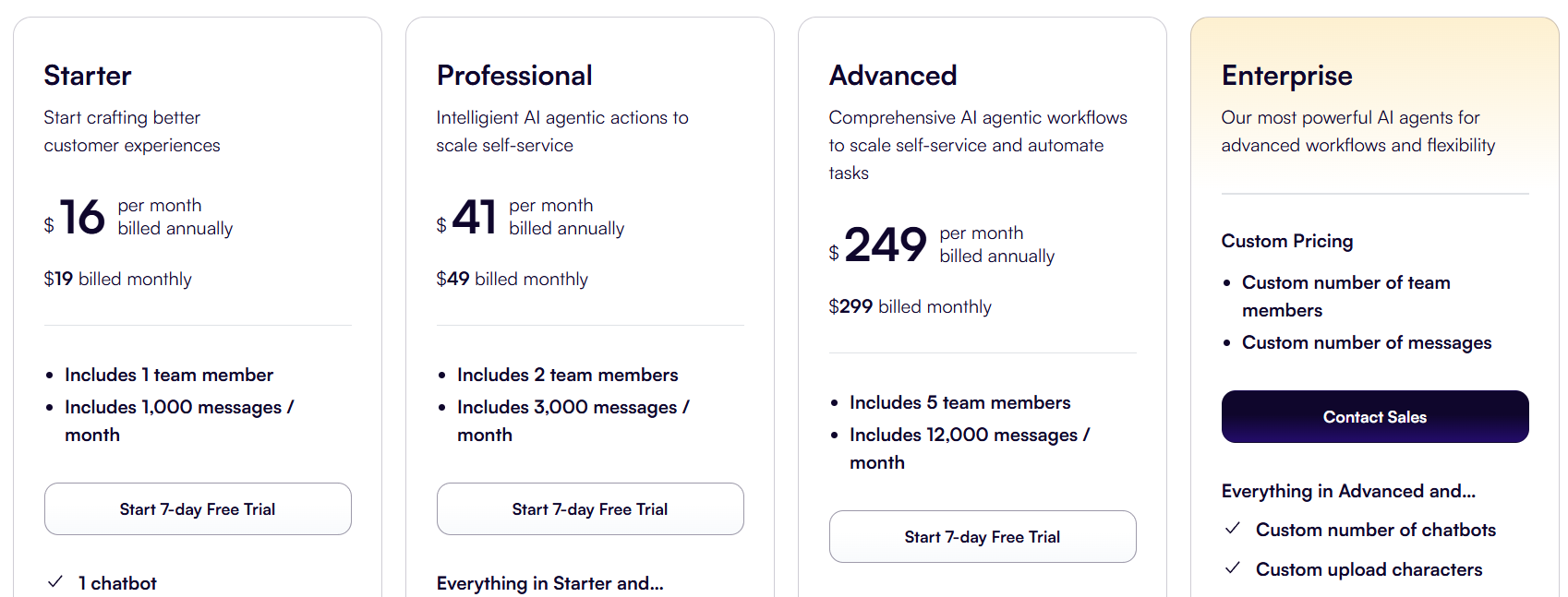
Botsonic offers several pricing tiers to accommodate different business needs:
- Starter: $16/month (billed annually) for 1 chatbot, 1,000 messages, and basic features.
- Professional: $41/month (billed annually) for 2 chatbots, 3,000 messages, and advanced integrations.
- Advanced: $249/month (billed annually) for 2 chatbots, 12,000 messages, and comprehensive AI workflows.
- Enterprise: Custom pricing for larger organizations requiring tailored solutions.
Each plan includes a 7-day free trial, allowing businesses to explore Botsonic’s capabilities before committing.
Gong
Best for: analyzing calls and emails to improve sales conversations and close more deals
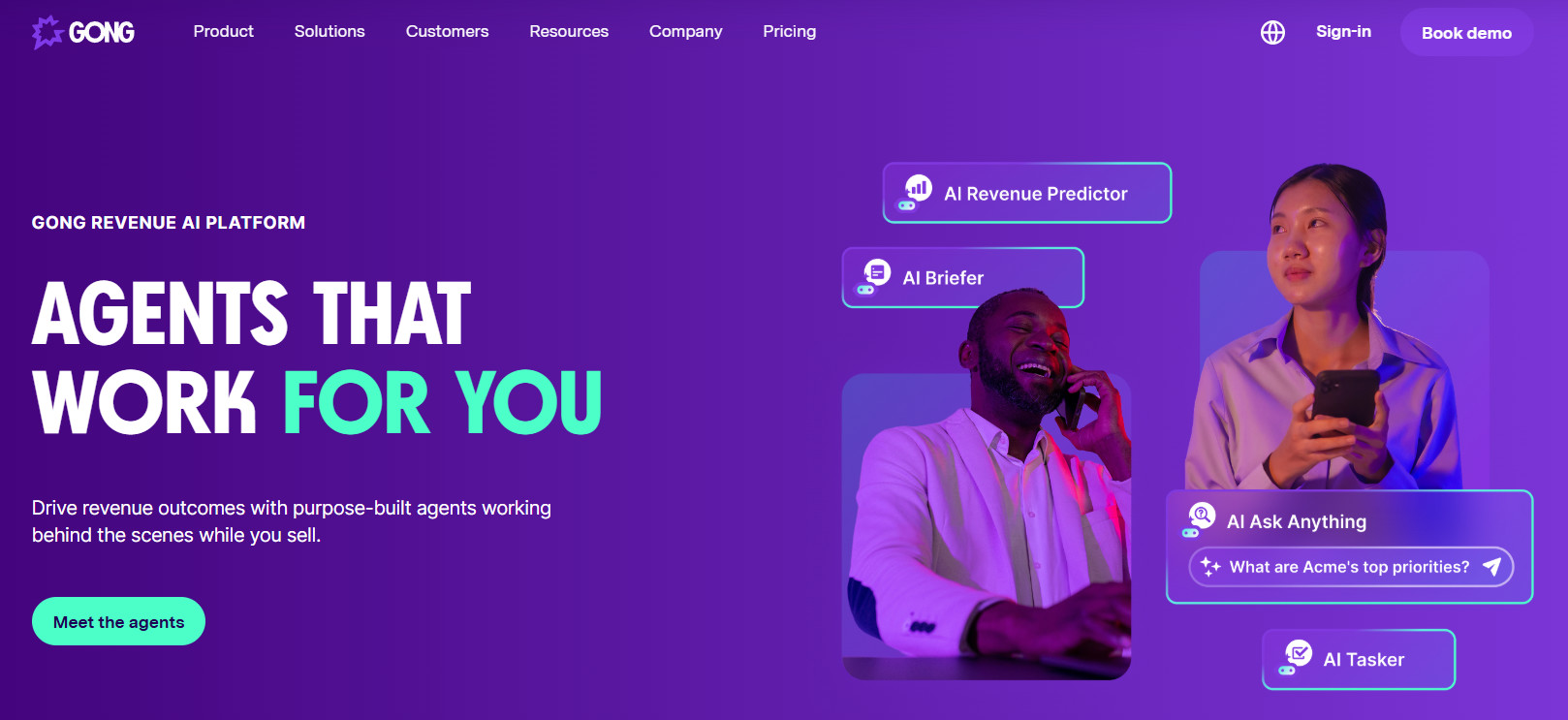
Gong helps Sales teams uncover what really drives conversions. It uses conversation intelligence to analyze every call, email, and meeting — showing what top agents do differently. By turning those insights into team-wide coaching, Gong helps reps close more deals with less guesswork.
This tool is a strong fit for mid-sized to enterprise-level companies in SaaS, finance, or healthcare. If your team juggles complex customer relationships or long Sales cycles, Gong brings clarity to what works — and what doesn’t. It’s especially useful for leaders looking to scale coaching and improve rep performance using real data.
Features for sales
Recording and transcribing calls, meetings, and email threads
- Highlighting winning talk patterns and objection handling techniques
- Delivering personalized feedback to Sales agents
- Monitoring customer sentiment and engagement across channels
- Forecasting pipeline accuracy and identifying at-risk deals
Pricing
Gong provides pricing details upon request. But some sources say that pricing includes a platform fee (starting around $5,000/year) and a per-user license ($1,200–$1,600/year). Cost varies by team size and features needed. It’s best suited for larger companies ready to invest in a full-scale AI sales agents platform to support and coach every agent.
Lavender
Best for: crafting personalized sales emails that boost prospecting success
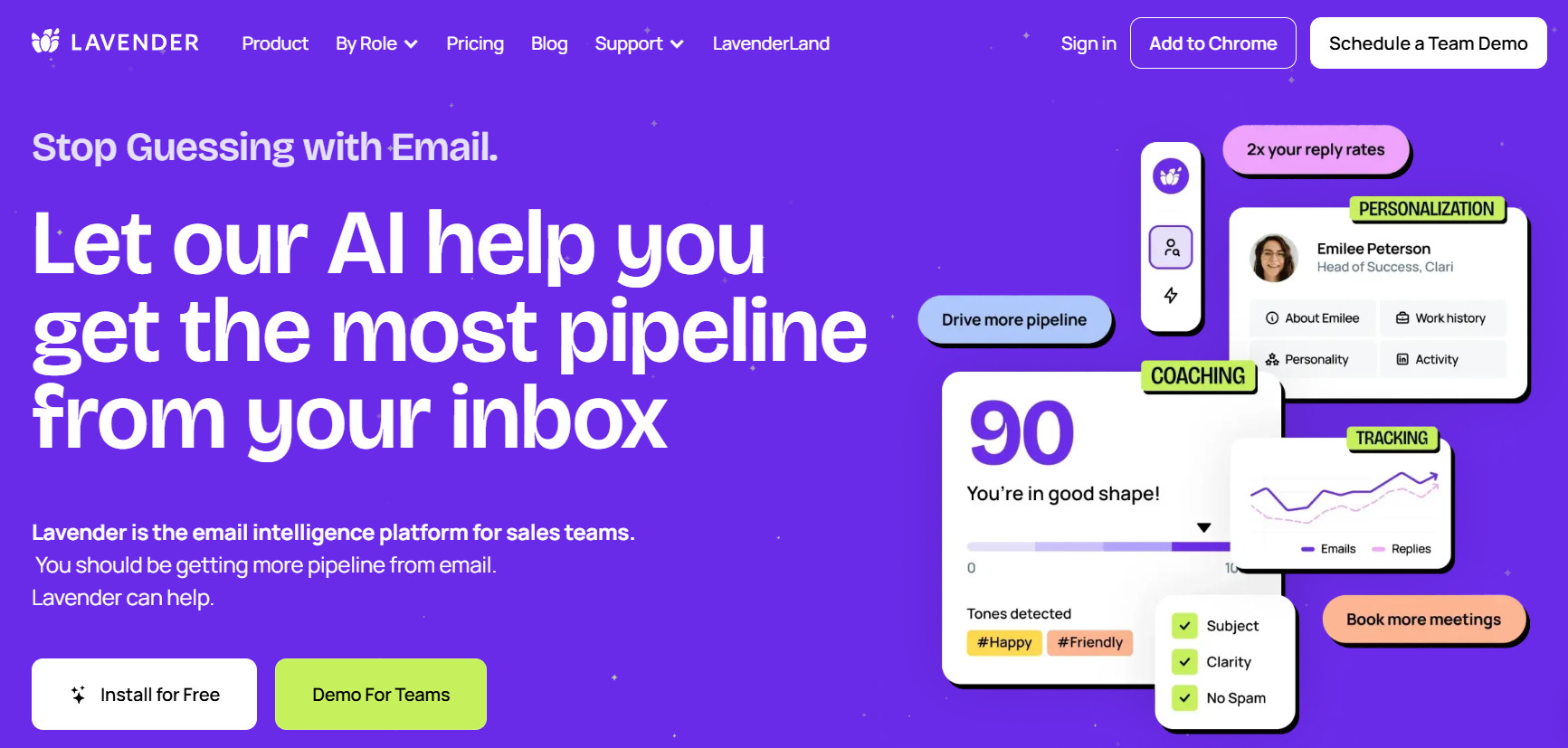
Lavender is an AI-powered email assistant designed to help Sales reps write more effective, personalized emails, enhancing prospecting efforts and increasing reply rates. By providing real-time coaching and suggestions, Lavender enables teams to communicate more efficiently with potential customers, making it a valuable tool for Sales professionals aiming to improve their outreach.
Ideal for individual sales reps, small businesses, and larger teams seeking to optimize their email communication, Lavender integrates seamlessly with platforms like Gmail, Outlook, and popular CRM systems. Its user-friendly interface and actionable insights make it accessible for users at all levels of technical proficiency.
Features for sales
Real-time analysis and scoring of sales emails
- Providing personalized suggestions to enhance email effectiveness
- Assisting in prospecting by identifying key areas for improvement
- Integrating with existing email platforms for seamless workflow
- Offering insights to support Sales teams in achieving better results
Pricing

Lavender offers a range of pricing plans to accommodate different needs:
- Free Plan: Analyze and personalize up to 5 emails per month, suitable for occasional users.
- Starter Plan: Priced at $29/month (billed monthly), this plan provides unlimited email analysis and personalization, along with chat support.
- Pro Plan: At $49/month (billed monthly), users gain access to all Starter features plus priority support and additional integrations.
- Team Plan: Designed for sales teams, this plan costs $99/user/month (billed monthly) and includes team analytics, coaching dashboards, and dedicated customer support.
Each plan is tailored to support sales reps and teams in enhancing their email communication, making Lavender a versatile tool for improving prospecting outcomes.
Regie.ai sales agent
Best for: automating lead prioritization and outreach at scale
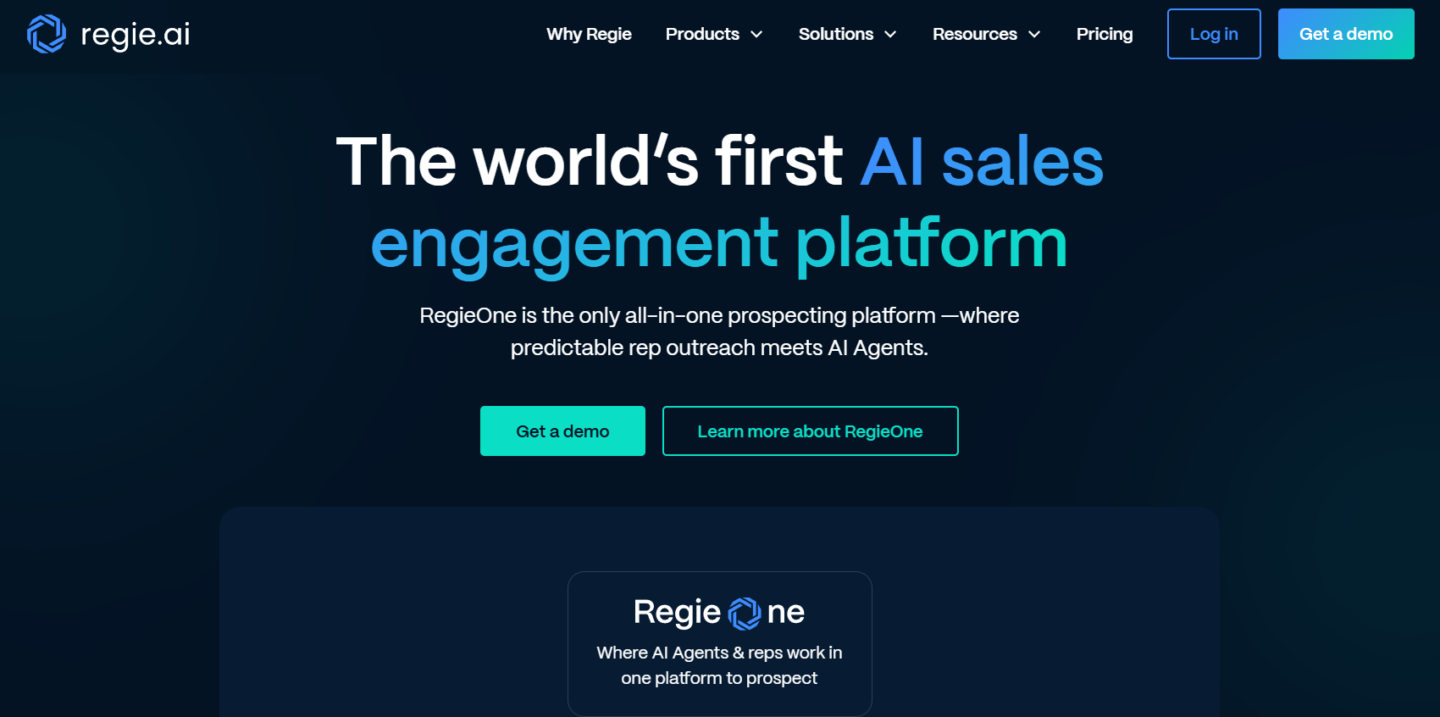
Regie.ai is an advanced AI sales agents platform built to automate outbound sales tasks like contact enrichment, messaging, and follow-ups. By integrating Agentic AI into your workflow, Regie helps agents scale prospecting with precision — keeping every customer engaged until they’re ready to convert.
It’s ideal for mid-sized to large sales teams working in high-volume industries like SaaS, tech, or services. If your reps are stretched thin across too many leads, Regie.ai fills the gap with autonomous engagement, real-time prioritization, and multi-channel outreach.
AI sales agents features
Enriching contact data with first- and third-party sources
- Prioritizing leads based on customer intent signals
- Supporting sales agents with multi-channel outreach
- Auto-generating tasks and follow-ups
- Dialing with AI scripts and voicemail drops
Pricing
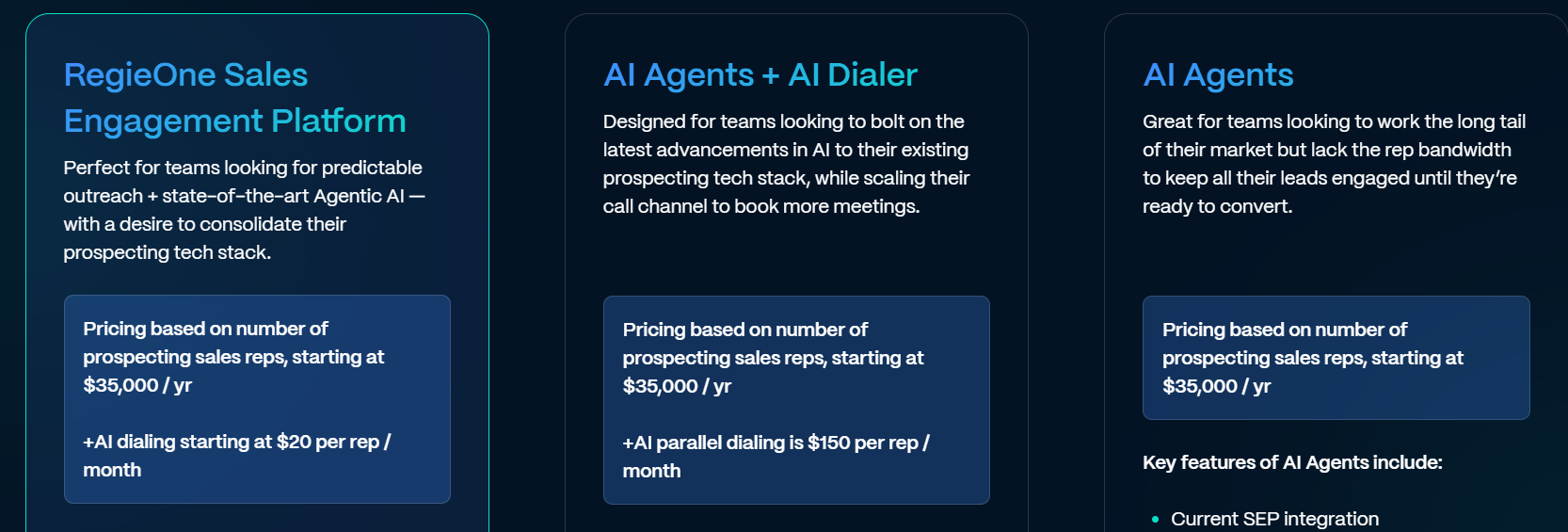
Regie.ai offers three core plans, all based on the number of prospecting sales reps, starting at $35,000/year:
- RegieOne Sales Engagement Platform (AI dialer + enrichment + domain management)
- AI Agents + AI Dialer (includes parallel dialing from $150/rep/month)
- AI Agents only (intent-based engagement + adaptive workflows)
Add-ons like AI dialing start at $20 per rep/month, depending on your plan. Perfect for companies ready to scale sales with AI sales agents doing the heavy lifting.
Crystal
Best for: tailoring sales emails and pitches using personality intelligence
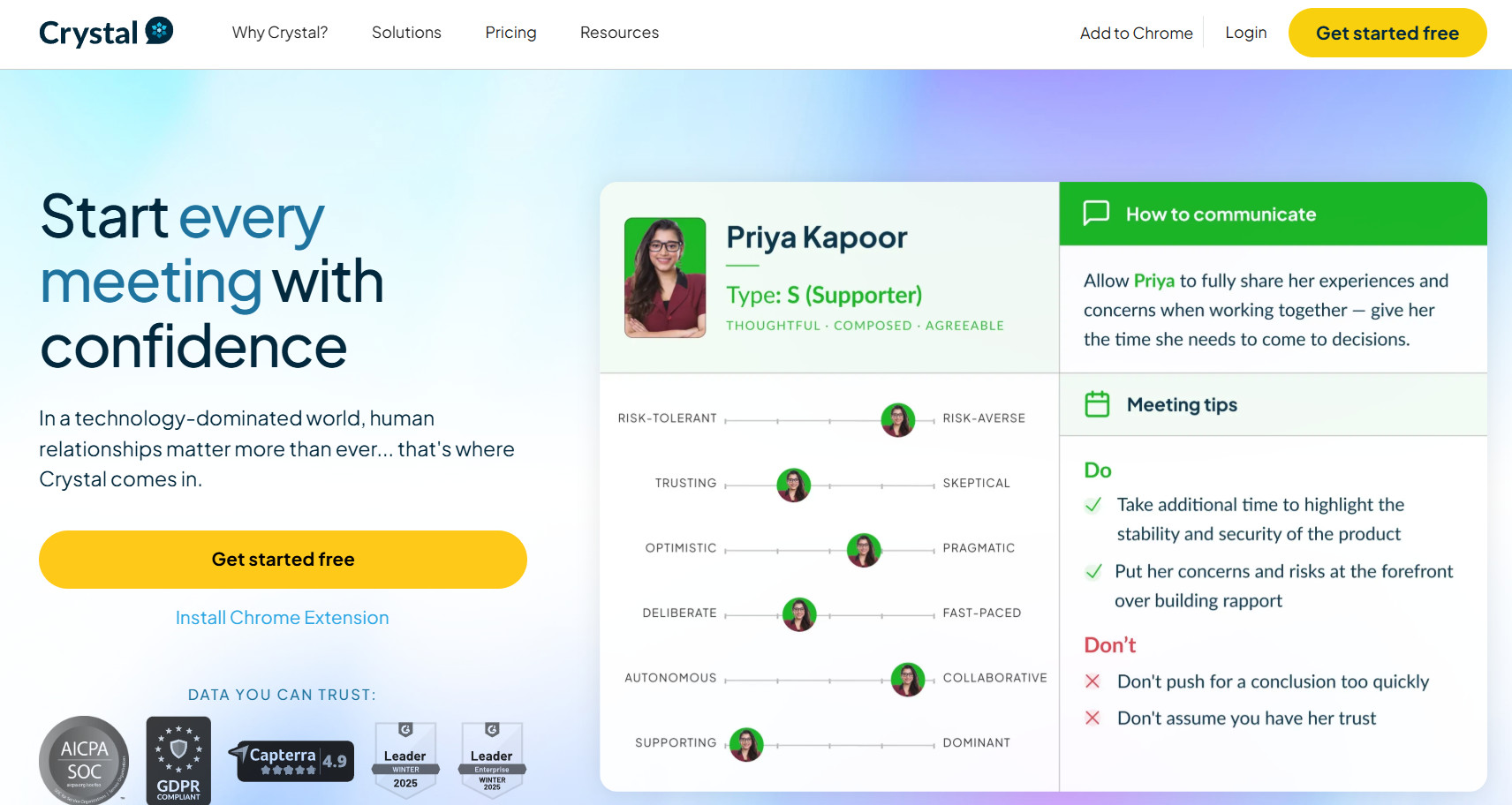
Crystal is a personality AI platform that equips sales teams with actionable insights to craft more personalized outreach. By analyzing public data, Crystal predicts a prospect’s DISC personality type, helping reps adjust tone, messaging, and communication style to resonate more effectively. This boosts engagement and shortens the path to a closed deal.
Crystal is ideal for B2B sales teams in SaaS, finance, and consulting — especially those managing long deal cycles or high-stakes accounts. It integrates with platforms like LinkedIn, Gmail, Salesforce, and HubSpot, making it easy to bring personality intelligence into daily workflows.
AI sales agents features
Analyzing LinkedIn profiles to generate DISC personality insights
- Providing personalized email and messaging suggestions
- Creating adaptive sales playbooks for different buyer types
- Offering pre-meeting prep tools to align with prospect preferences
- Delivering team-wide coaching to enhance communication strategies
Pricing
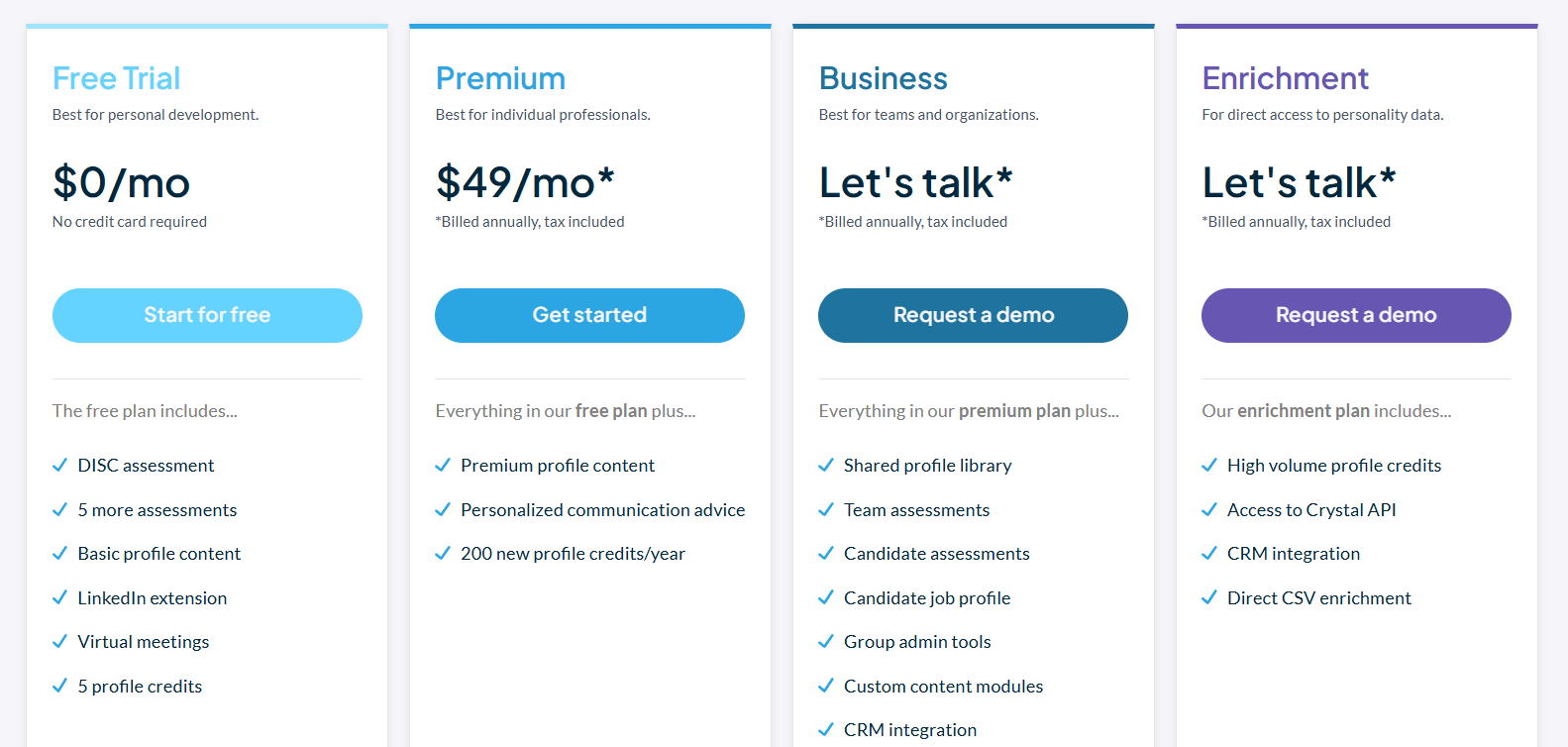
Crystal offers several pricing tiers:
- Free: $0/month. Includes basic profile content and 5 profile credits.
- Premium: $49/month (billed annually). Offers premium profile content, personalized communication advice, and 200 profile credits per year.
- Business and Enrichment: Custom pricing. Designed for teams and organizations, includes shared profile libraries, CRM integration, and dedicated support.
Crystal also offers an “Intelligence” plan starting at $999/month for autonomous research reports, including executive and customer intelligence.
For sales teams aiming to enhance their outreach with personality-driven insights, Crystal serves as an effective AI agent to improve communication and close more deals.
Clari
Best for: forecasting revenue and managing deals with AI-powered insights
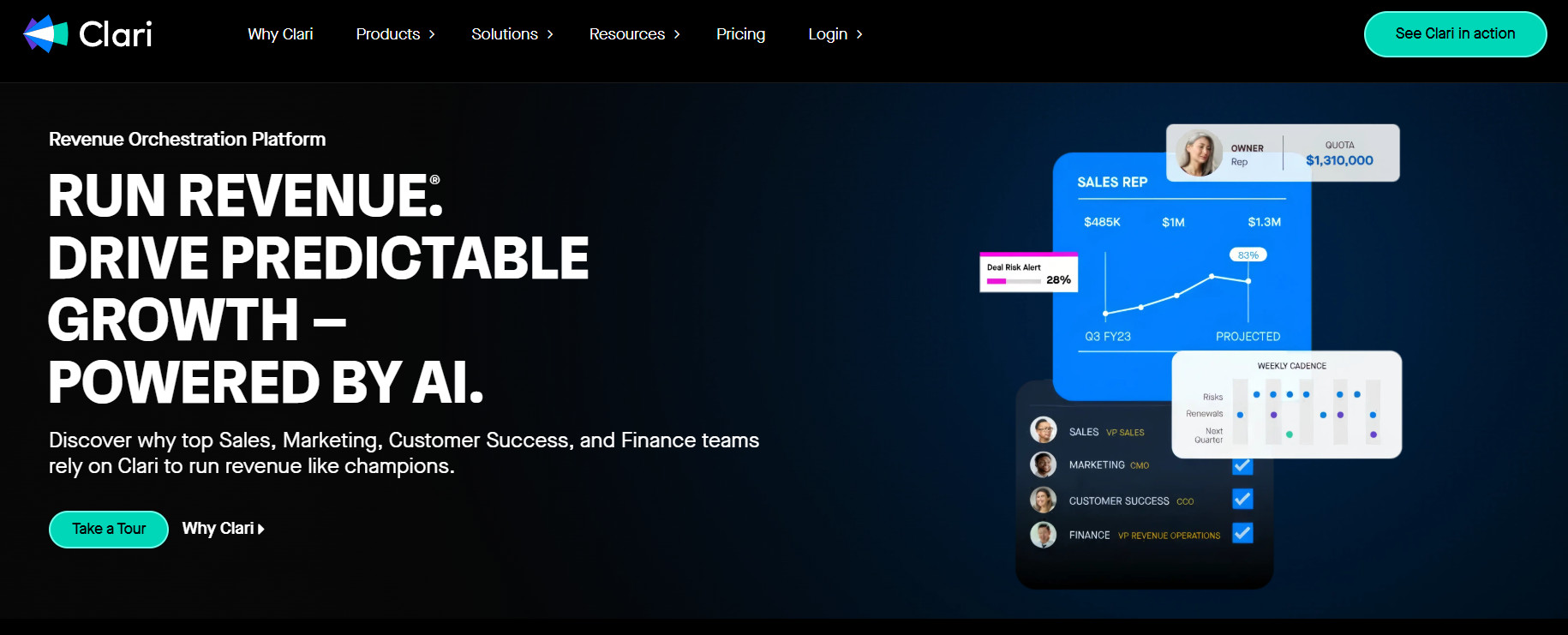
Clari is a comprehensive revenue platform that empowers sales teams to drive predictable growth by leveraging AI agent capabilities. It provides real-time visibility into the entire sales pipeline, enabling agents to focus on high-impact tasks and make informed decisions.
Ideal for mid-sized to large enterprises across various industries, Clari integrates seamlessly with existing CRM systems, enhancing customer engagement and streamlining sales processes. Its modular structure allows organizations to tailor the platform to their specific needs, ensuring flexibility and scalability.
AI sales agents features
Automating data capture from emails, meetings, and CRM entries
- Providing AI-driven forecasting to predict revenue outcomes
- Identifying at-risk deals and suggesting corrective actions
- Enhancing sales agent productivity through workflow optimization
- Facilitating cross-functional collaboration among teams
Pricing

Clari’s pricing is modular and varies based on the selected features and number of users. According to available data, annual costs range from approximately $17,510 to $426,887, with a median price of $80,334. The platform offers various modules, including Forecast, Copilot, Align, and Groove, each designed to address specific aspects of the revenue process.
By integrating Clari into their operations, sales teams can harness the power of AI agents to enhance forecasting accuracy, streamline tasks, and improve customer engagement, ultimately driving revenue growth.
Conversica
Best for: automating lead follow-up and qualification with AI-powered agents
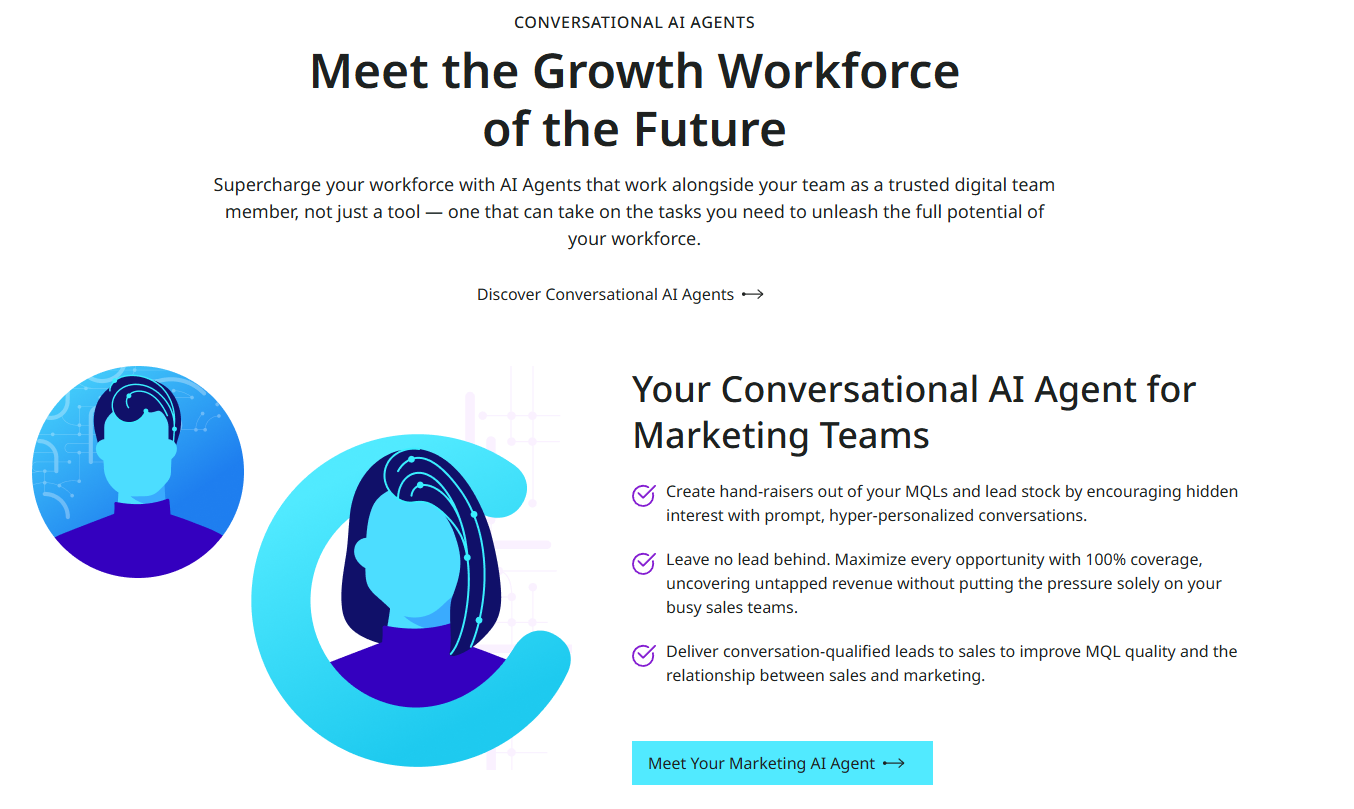
Conversica is a leading provider of AI-driven solutions designed to enhance sales processes by automating lead engagement and qualification. Their AI agents interact with potential customers through natural, two-way conversations, ensuring timely follow-ups and freeing human agents to focus on closing deals.
Ideal for mid-sized to large enterprises across various industries, Conversica integrates seamlessly with existing CRM systems and marketing platforms. This enables sales teams to efficiently manage tasks, improve customer engagement, and accelerate the sales cycle.
AI sales agents features
- Automating initial outreach and follow-up communications
- Qualifying leads based on predefined criteria
- Scheduling meetings between prospects and sales agents
- Re-engaging dormant leads to revive interest
- Providing insights and analytics to optimize sales strategies
Pricing
Conversica offers a subscription-based pricing model starting at approximately $2,999 per month (according to available data from GetApp). The cost varies depending on the specific needs and scale of the organization. For detailed pricing information and to explore the best plan for your sales team, it’s recommended to contact Conversica directly.
By leveraging Conversica’s AI agents, businesses can automate repetitive tasks, enhance customer interactions, and empower their sales teams to focus on high-value activities that drive revenue growth.
Reply.io
Best for: automating multichannel prospecting with AI-powered sales agents
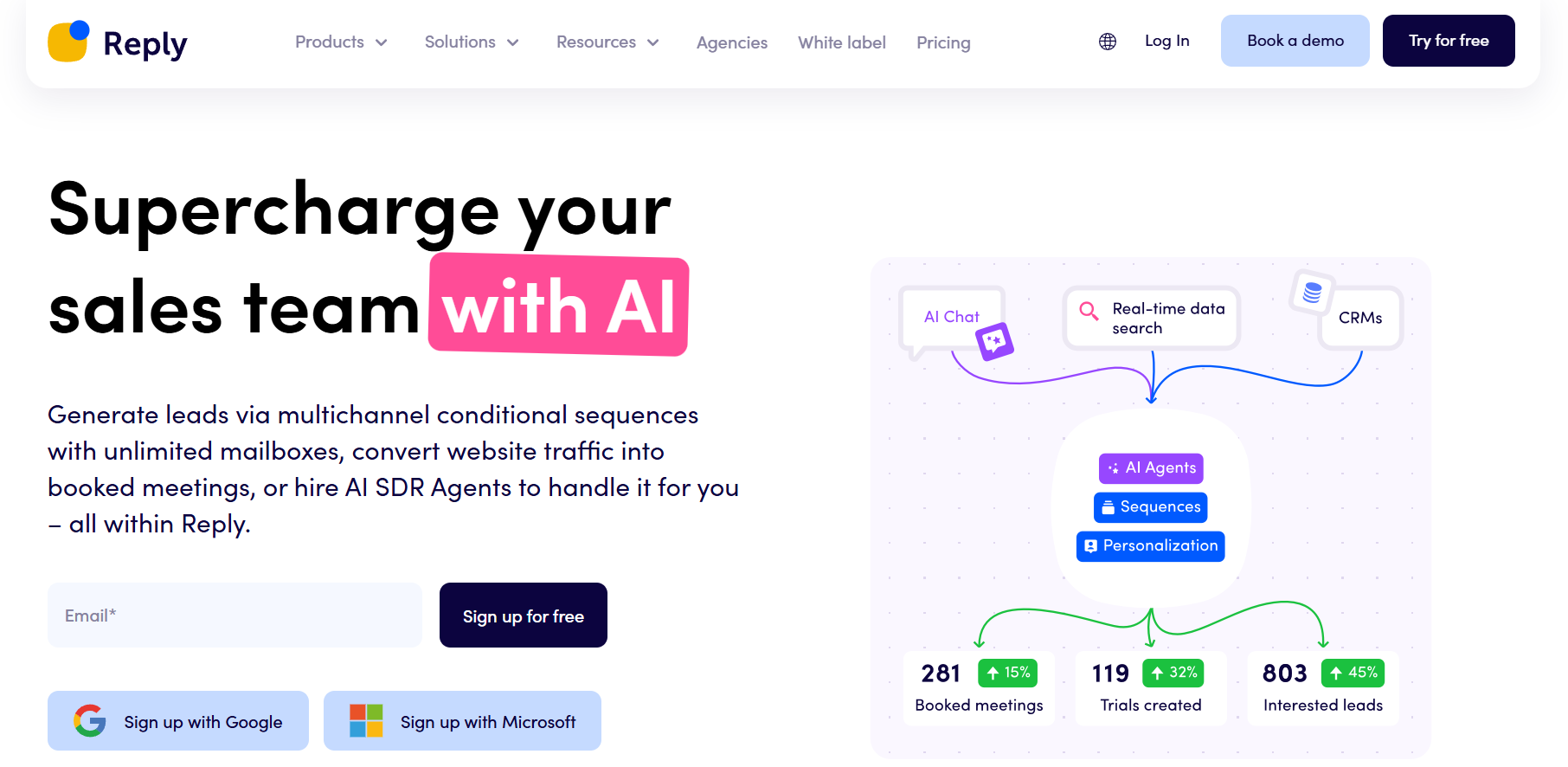
Reply.io is a robust platform for streamlining sales outreach through automation. With its AI-powered assistant Jason, teams can delegate repetitive prospecting and follow-up tasks to a fully automated sales agent. It enables reps to engage with prospects across email, LinkedIn, SMS, and calls — all from a single platform.
Ideal for SMBs and scaling sales teams, Reply.io blends powerful automation with human-like outreach. It’s especially helpful for teams aiming to increase outbound capacity without growing headcount.
Agents features
- Running high-volume prospecting campaigns across multiple channels
- Personalizing emails and follow-ups using AI
- Responding automatically to prospect replies
- Scheduling meetings on behalf of sales reps
- Tracking campaign performance and optimizing sequences
Pricing
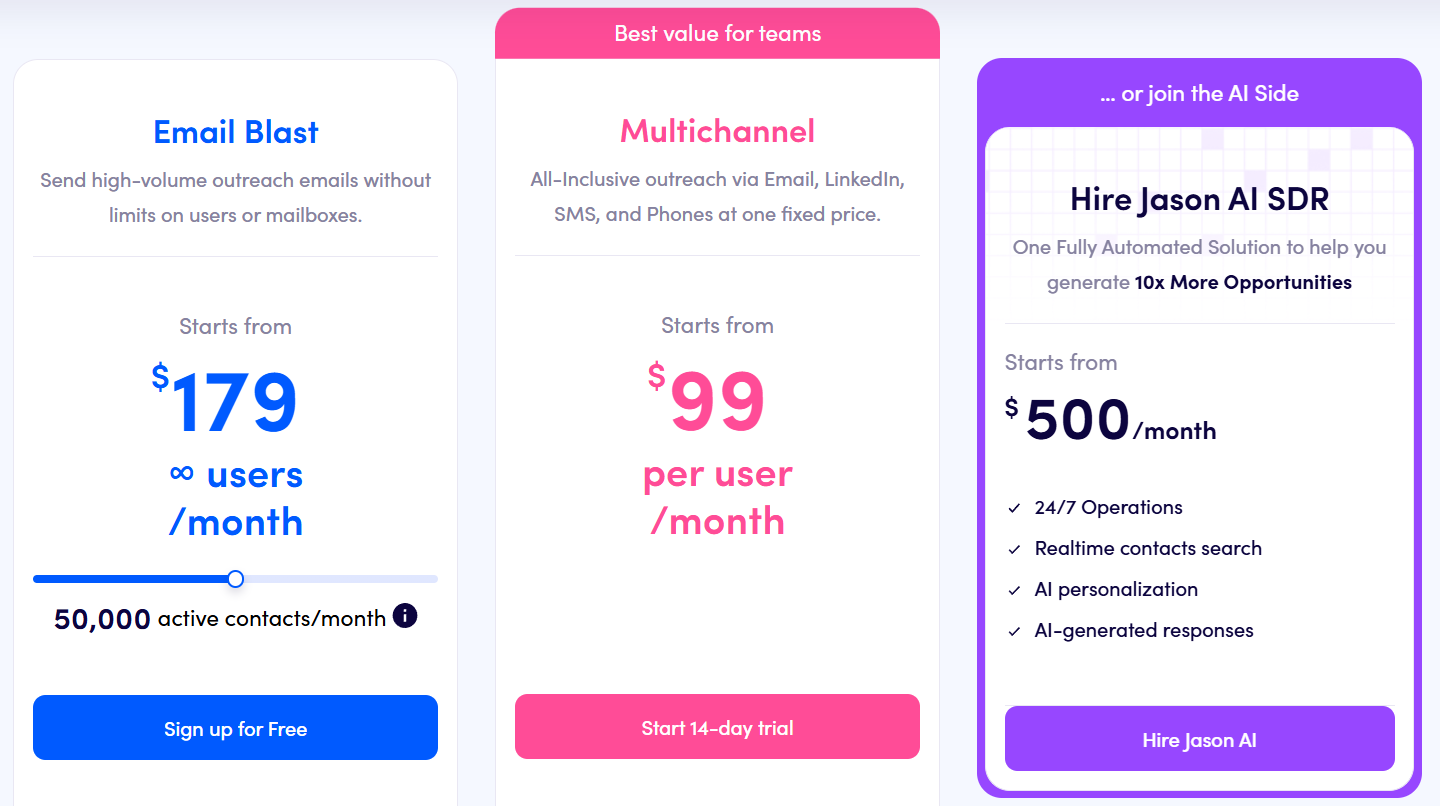
Reply.io offers three pricing tiers:
- Email Blast: $49/user/month for unlimited email outreach, 1,000 contacts/month
- Multichannel: $89/user/month for full access to email, LinkedIn, SMS, and phone tools
- Hire Jason AI SDR: $300/month for 24/7 AI sales agent operations, including real-time contact search and AI-generated replies
Reply is perfect for modern sales teams looking to automate prospecting without losing the human touch.
People.ai
Best for: automating sales activity capture and enhancing forecasting accuracy
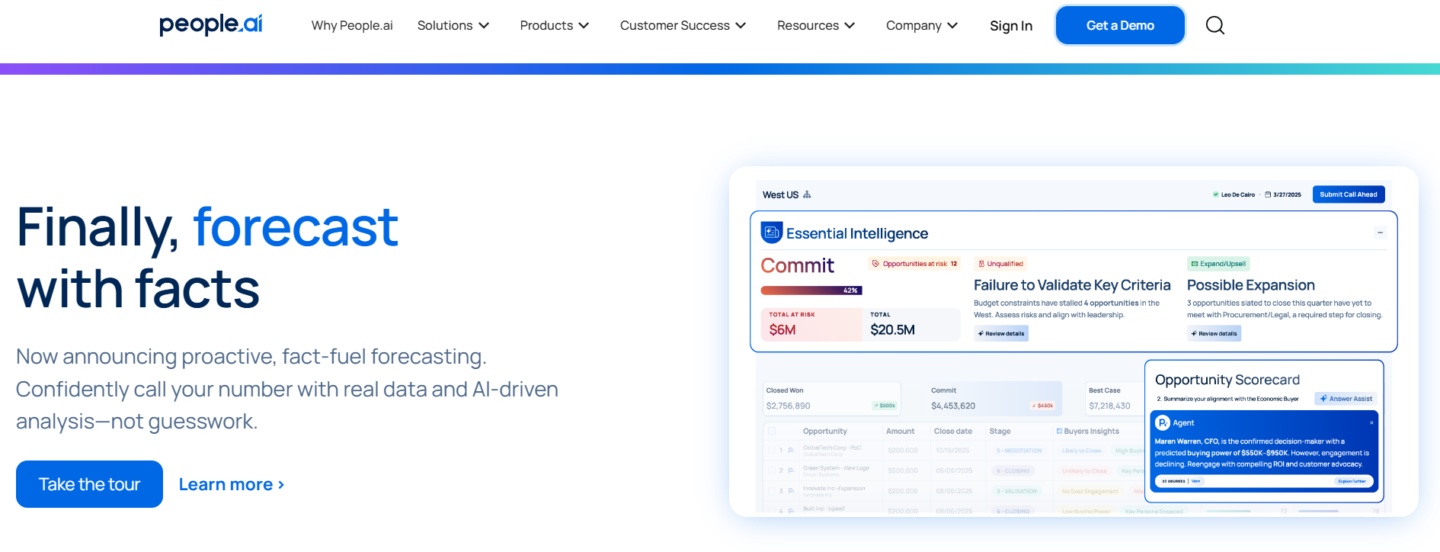
People.ai is a revenue intelligence platform designed to empower sales teams by automating data capture and providing actionable insights. By leveraging AI agents, it enables reps to focus on high-value activities, improving productivity and forecast accuracy.
Ideal for mid-sized to large enterprises across various industries, People.ai integrates seamlessly with existing CRM systems, enhancing sales processes and prospecting efforts. Its robust features support sales agents in managing complex pipelines and engaging effectively with customers.
Agents features
- Automating the capture of sales activities from emails, meetings, and calls
- Providing AI-driven insights to improve sales strategies
- Enhancing prospecting by identifying key decision-makers
- Streamlining pipeline management for sales reps
- Offering analytics to forecast revenue more accurately
Pricing
People.ai offers customized pricing based on the size of your sales team and specific analytics needs. According to available data, annual costs range from approximately $2,211 to $114,048, with a median price of $17,784. The platform provides tailored solutions to fit different business requirements, ensuring that sales teams can leverage its features effectively to enhance their prospecting and overall performance.
Apollo.io
Best for: scaling outbound prospecting with AI-powered sales automation

Apollo.io is an all-in-one sales platform that combines a vast B2B contact database with powerful automation tools. It empowers sales reps to efficiently manage prospecting activities, from lead generation to outreach, by leveraging AI-driven insights and workflows.
Ideal for sales teams of all sizes, Apollo.io offers a comprehensive suite of features that streamline the sales process. Its user-friendly interface and seamless integrations with popular CRM systems make it a valuable asset for organizations aiming to enhance their prospecting strategies and drive revenue growth.
Agents features
- Identifying and targeting potential leads using advanced filters
- Automating personalized email sequences for outreach
- Enriching contact data to improve lead quality
- Tracking engagement metrics to refine sales strategies
- Integrating with CRM systems for streamlined workflow management
Pricing
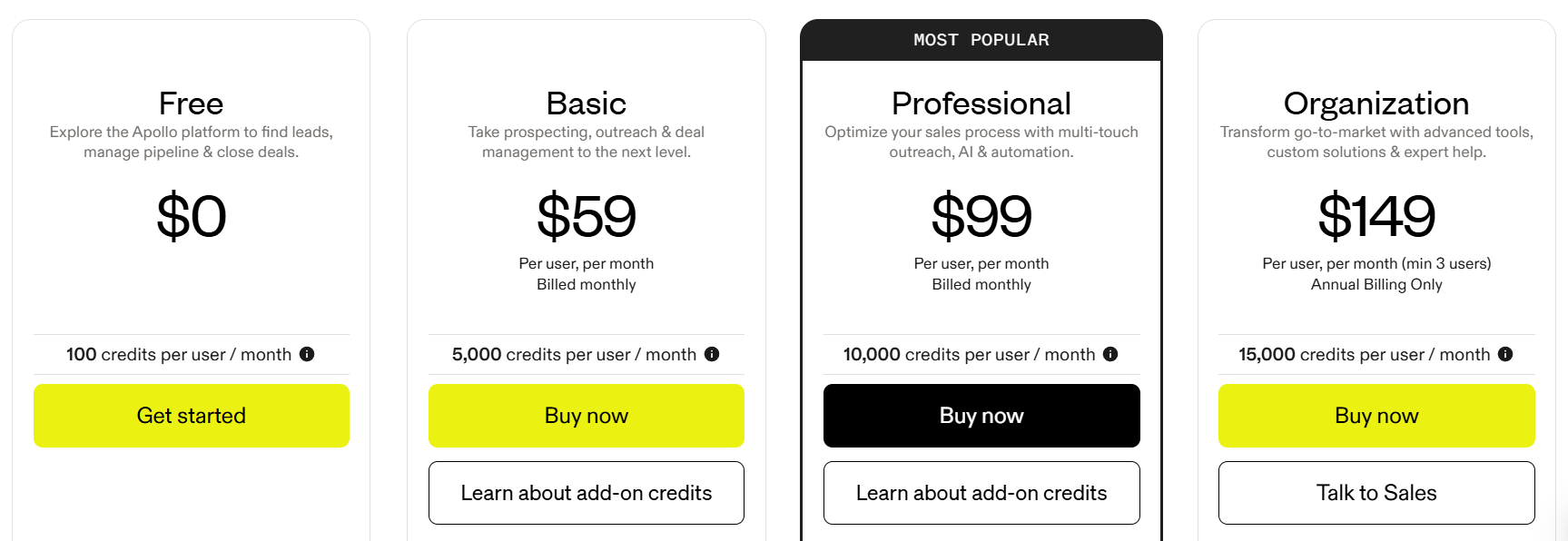
Apollo.io offers a range of pricing plans to accommodate different business needs:
- Free Plan: $0/month. Includes limited access to the platform’s features, suitable for individuals or small sales teams exploring the tool.
- Basic Plan: $49/user/month (billed annually). Offers enhanced features for sales reps looking to scale their prospecting efforts.
- Professional Plan: $79/user/month (billed annually). Provides advanced features and integrations for growing sales teams.
- Organization Plan: $119/user/month (billed annually). Designed for larger organizations requiring comprehensive sales solutions and dedicated support.
Each plan is tailored to support sales reps and teams in enhancing their prospecting efforts, improving data management, and driving overall sales performance.
InsightSquared
Best for: enhancing sales forecasting and pipeline management with AI-driven insights
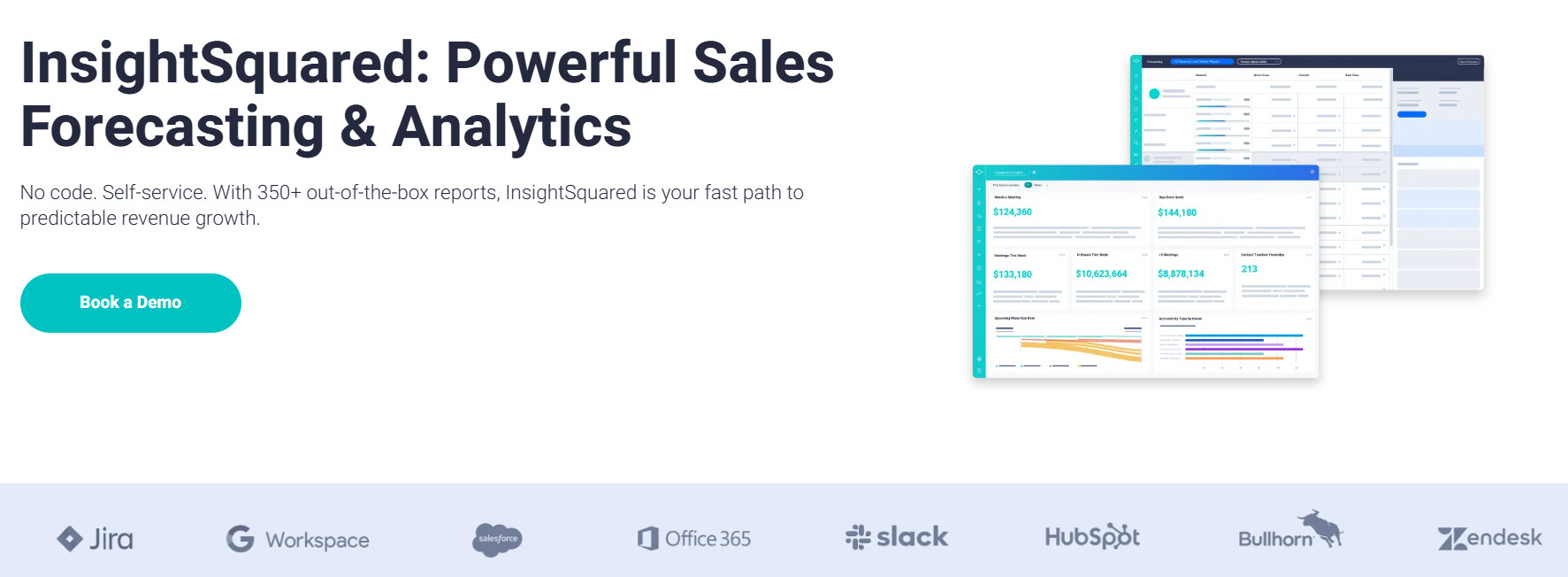
InsightSquared, now part of Mediafly’s Revenue360 platform, empowers sales teams with advanced analytics and forecasting capabilities. By leveraging AI, it transforms raw data into actionable insights, enabling sales agents to make informed decisions and close deals more effectively.
Ideal for mid-sized to large enterprises across various industries, InsightSquared integrates seamlessly with existing CRM systems, enhancing sales processes and prospecting efforts. Its robust features support sales agents in managing complex pipelines and engaging effectively with customers.
Data features and more
- Automating the capture of sales activities from emails, meetings, and calls
- Providing AI-driven insights to improve sales strategies
- Enhancing prospecting by identifying key decision-makers
- Streamlining pipeline management for sales reps
- Offering analytics to forecast revenue more accurately
Pricing
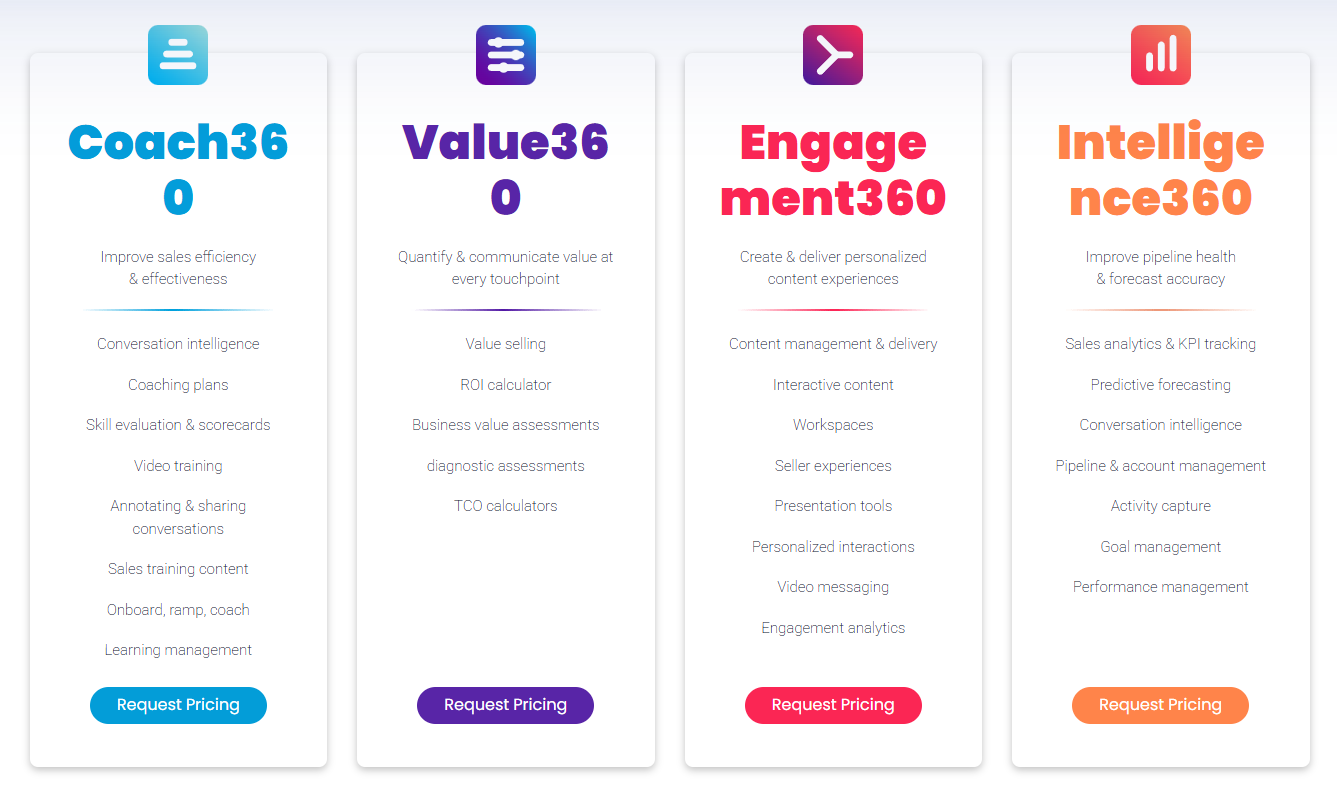
InsightSquared’s pricing is tailored to each organization’s specific needs and is available upon request through Mediafly. The platform offers various modules, including Forecast, Copilot, Align, and Groove, each designed to address specific aspects of the revenue process.
By integrating InsightSquared into their operations, sales teams can harness the power of AI to enhance forecasting accuracy, streamline tasks, and improve customer engagement, ultimately driving revenue growth.
Outreach.io
Best for: automating outreach and follow-up tasks with AI-powered sales agents
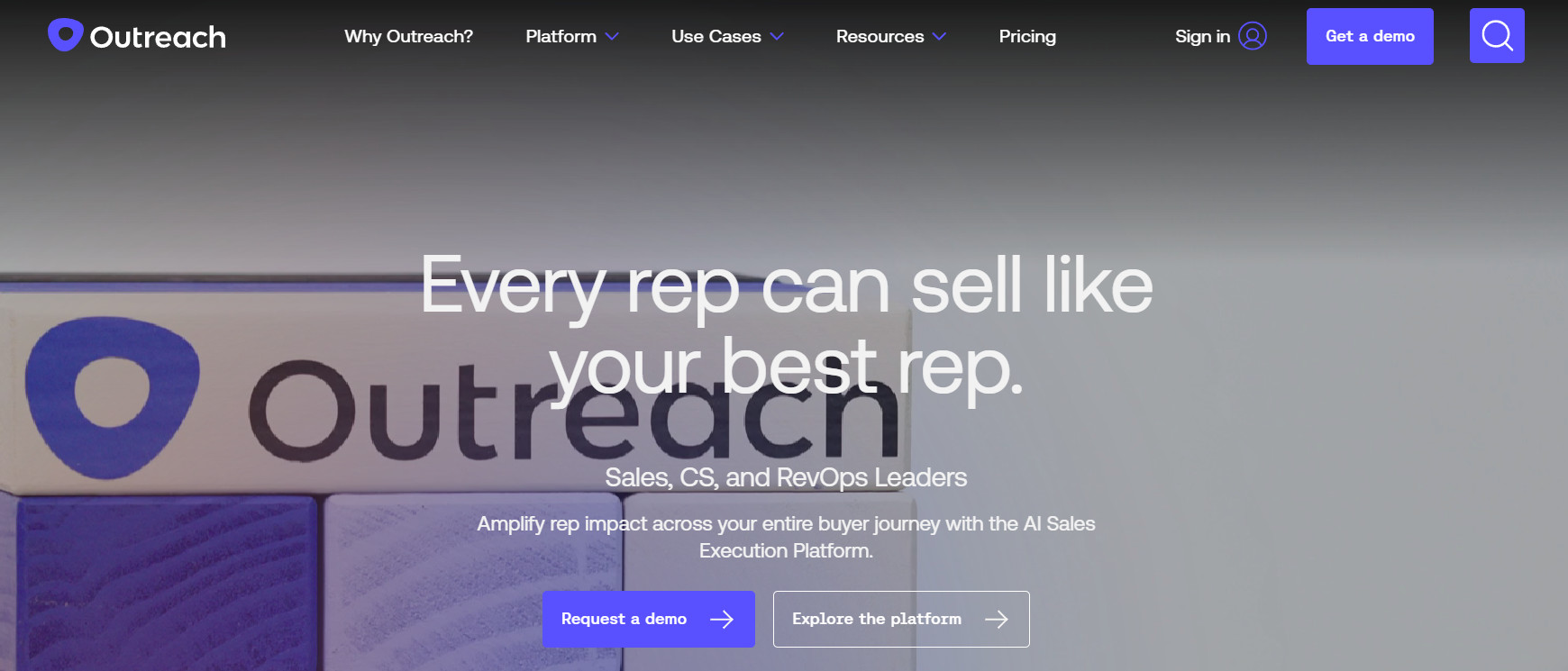
Outreach.io is a leading sales execution platform that leverages AI sales agents to streamline and automate various sales processes. By utilizing AI-driven insights, Outreach.io enables sales agents to engage with customers more effectively, ensuring timely follow-ups and personalized communication.
Ideal for mid-sized to large enterprises, Outreach.io integrates seamlessly with existing CRM systems, enhancing sales workflows and improving customer engagement. Its robust features support sales agents in managing complex pipelines and executing tasks efficiently.
Features for sales
- Automating email sequences and follow-up communications
- Prioritizing leads based on engagement and intent data
- Providing AI-driven insights to optimize sales strategies
- Streamlining task management for sales agents
- Enhancing customer interactions through personalized outreach
Pricing
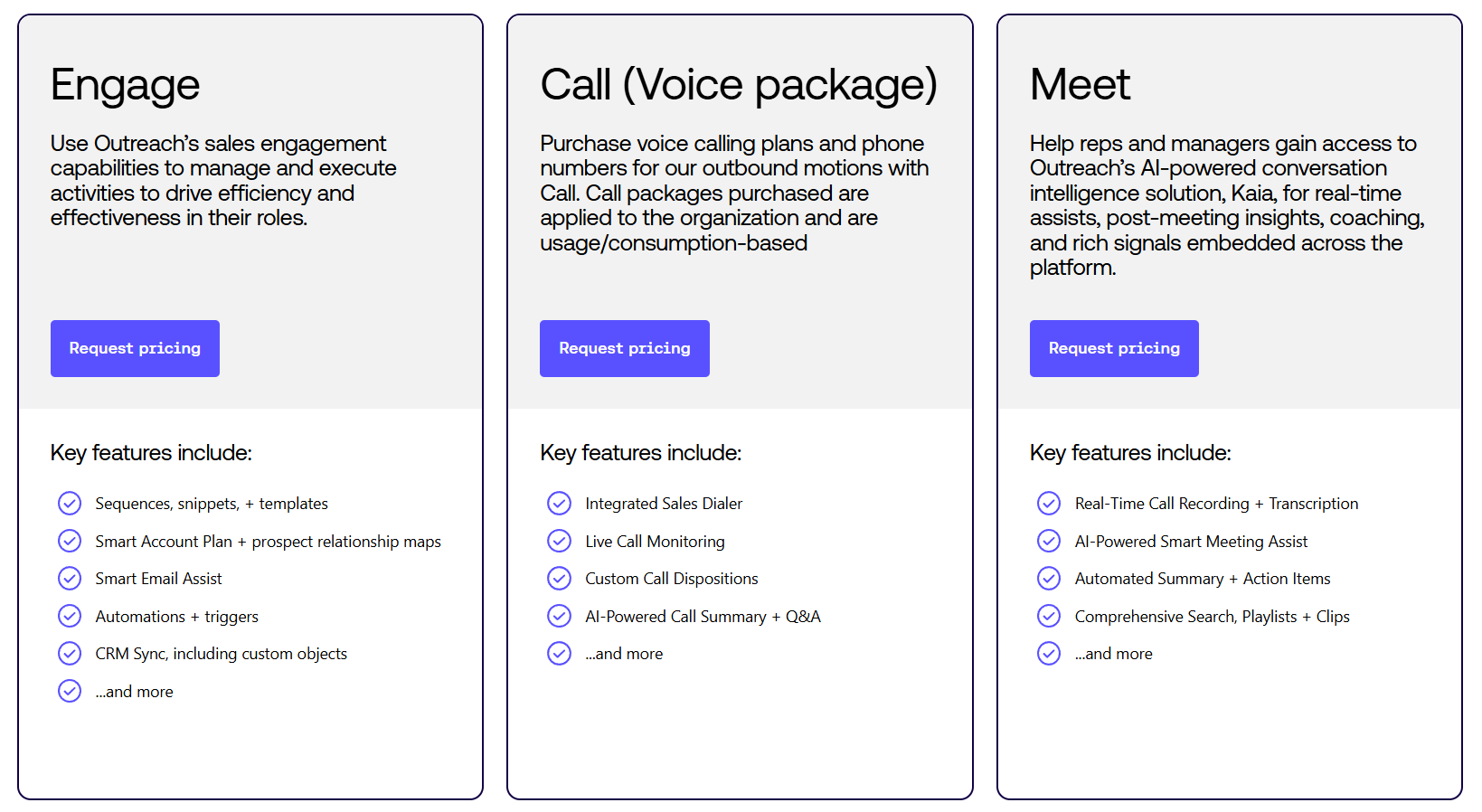
Outreach.io offers a range of pricing plans tailored to different business needs. While specific pricing details are not publicly disclosed, plans are billed annually and start at approximately $100 per user per month. The platform provides various packages, including Engage, Call, Meet, Deal, and Forecast, each designed to address specific aspects of the sales process. For detailed pricing information and to explore the best plan for your organization, it’s recommended to contact Outreach.io directly.
By integrating Outreach.io into their operations, sales teams can harness the power of AI sales agents to automate tasks, improve customer engagement, and drive revenue growth.
Wrapping up
Integrating AI sales agents into your workflow means faster prospecting, smarter follow-ups, and fewer missed opportunities. They help sales teams scale without burnout. If you’re ready to boost performance and close more deals, now’s the time to test AI in your sales process.
FAQ on AI sales agents
An AI sales agent is a digital assistant that automates routine sales tasks like lead outreach, follow-ups, and pipeline updates. It helps teams save time and close more deals.
They analyze data from CRM systems, calls, and emails to identify patterns, prioritize leads, and suggest next steps for better sales performance.
Yes. They generate personalized email content based on prospect behavior, job role, or previous conversations—boosting engagement and reply rates.
Reputable tools follow strict data protection standards, ensuring sensitive customer and sales information stays safe.
Any sales team looking to scale outreach, automate follow-ups, and improve conversion rates with personalized touchpoints can benefit.




